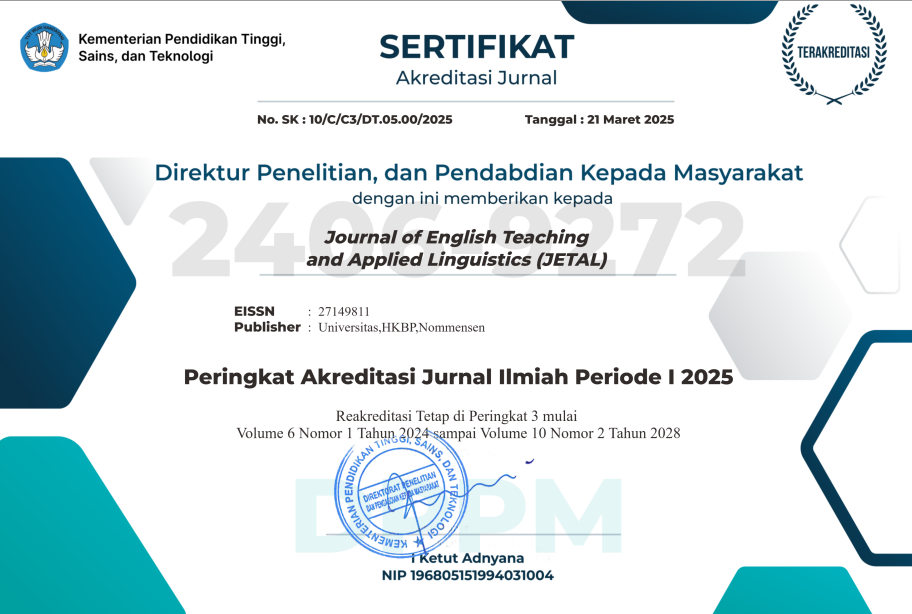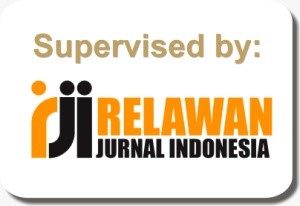EXPLORING STUDENTS’ INTEREST IN LEARNING ENGLISH AS A FOREIGN LANGUAGE THROUGH TRADITIONAL GAMES IN 2nd GRADERS
Abstract
This study investigates students’ interest in learning English as a foreign language through traditional games in primary school. Using a qualitative descriptive method, the research focuses on student interest based on classroom observations and interviews, applying Schiefele’s (2009) indicators of student interest. The study population includes grades 2A, 2B, and 2C (87 students) at SDIT Permata Hati, Tebing Tinggi. A purposive sample of 29 students from grade 2B was selected. Data collection involved interviews and classroom observations. The findings indicate that a majority of students show high interest in learning English through traditional games. During game-based activities, 96% of students demonstrated positive emotional responses such as excitement and enthusiasm, reflecting key indicators of interest. These results suggest that traditional games can effectively enhance student motivation and engagement in English learning. The findings offer practical implications for English teachers in utilizing traditional games as instructional media. Moreover, the study recommends further research to explore the effectiveness of traditional games in secondary school contexts, particularly in enhancing interest and developing language skills such as listening, speaking, reading, and writing.
References
Brown, H. D., & Lee, H. (2015). Teaching by Principles: An Interactive Approach to Language Pedagogy (4th ed.). Pearson Education.
Burman, E. (2021). Childhood, Education and the Stage of Development: Critical Reflections on the Early English Language Learning. Routledge.
Caillois, R., Sutton-Smith, B., & Bateson, G. (2001). Man, Play and Games. University of Illinois Press.
Cameron, L. (2001). Teaching Languages to Young Learners. Cambridge University Press.
Dodoo, S. (2022). Traditional Games: Socialization and Culture in Kabylie. In D. Turcanu-Carutiu (Ed.), Heritage—New Paradigm. IntechOpen. https://doi.org/10.5772/intechopen.98929
Gunantar, D. A. (2016). The Impact of English As An International Language On English Language Teaching In Indonesia. Journal of Language and Literature.
Harackiewicz, J. M., Smith, J. L., & Priniski, S. J. (2016). Interest Matters: The Importance of Promoting Interest in Education. Policy Insights from the Behavioral and Brain Sciences, 3(2), 220–227. https://doi.org/10.1177/2372732216655542
Hartanto, W., Fitriani, D., & Lestari, R. (2021). Traditional Games and Children's Social Skills: Reviving Local Wisdom in Modern Education. International Journal of Educational Research Review, 6(3), 356–364.
Hikmawan, I., Damayanti, I. L., & Setyarini, S. (2023). Integrating Traditional Games into EFL Speaking Class: A case of English for Young Learners. Journal of English Language Studies, 8(2), 249. https://doi.org/10.30870/jels.v8i2.19432
Kim, H., & Johnson, J. (2021). Physical Play and Learning in Children: Benefits of Traditional Games in Early Childhood Education. Journal of Child Development Studies, 8(1), 55–67.
Komaini, A., Sugiharto, D., & Nurhasanah, Y. (2024). Integrating Traditional Games in Elementary Curriculum: A Model for Holistic Development. Jurnal Pendidikan Indonesia, 13(1), 12–22.
Krashen, S. D. (2009). Principles and practice in second language acquisition (Reprinted). Pergamon Press.
Lestari, N., Mardiyana, A., & Suryadi, D. (2019). Traditional Game-Based Learning to Improve Students’ Motivation in Learning English. Journal of Educational Research and Practice, 9(2), 78–85.
Martin, J. R., & White, P. R. R. (2007). The Language of Evaluation: Appraisal in English. The Language of Evaluation: Appraisal in English, 1–278. https://doi.org/10.1057/9780230511910Mayowa, T. A. (2022). Cultural Significance of Indigenous Games in Early Education: A Nigerian Perspective. African Journal of Educational Research, 18(1), 33–45.
Moseley, A. (Ed.). (2014). New traditional games for learning: A case book. Routledge.
Novitawati, N., Purwanti, R., Prastitasari, H., Vitriati, N., & Olfah, K. (2022). Traditional Games as English Learning Media for Early Childhood. Jurnal Ilmiah Potensia, 7(2), 184–193. https://doi.org/10.33369/jip.7.2.184-193
Ren, C., & Kjeldsen, J. (2017). Traditional Games as Cultural Heritage: A Socio-Anthropological Perspective. Games and Culture, 12(3), 241–258. https://doi.org/10.1177/1555412015612535
Rusiana & Nuraeningsih. (2016). Teaching english to young learners through traditional games. Journal of Language and Literature, X/2(Language Circle), 193–200.
Schiefele, U. (2009). Situational and Individual Interest.
Thornbury (2002). How to Teach Vocabulary. Pearson Longman. https://www.emgywomenscollege.ac.in/templateEditor/kcfinder/upload/files/how%20to%20teach%20vocabulary1.pdf.
Wahyudin, A. Y., Pd, M., Aminatun, D., Pd, M., Mandasari, B., Pd, M., Sari, F. M., Pd, M., Hamzah, I., Pd, M., Ayu, M., Pd, M., Oktaviani, L., Pd, M., Alamsyah, R., & Kom, S. (2024). Basic Principles of English Language Teaching.

This work is licensed under a Creative Commons Attribution-ShareAlike 4.0 International License.
Authors retain copyright and grant the journal right of first publication with the work simultaneously licensed under a Creative Commons Attribution-ShareAlike 4.0 International License (CC BY-SA 4.0) that allows others to share the work with an acknowledgment of the work's authorship and initial publication in this journal.
Authors are able to enter into separate, additional contractual arrangements for the non-exclusive distribution of the journal's published version of the work (e.g., post it to an institutional repository or publish it in a book), with an acknowledgment of its initial publication in this journal.
Authors are permitted and encouraged to post their work online (e.g., in institutional repositories or on their website) prior to and during the submission process, as it can lead to productive exchanges, as well as earlier and greater citation of published work (See The Effect of Open Access).






